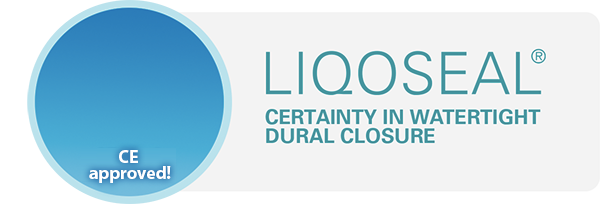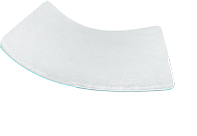First Patients Treated in First-in-Human Trial for ACTISEAL® – Polyganics’ Innovative Liver and Pancreas Sealant Patch
Groningen, The Netherlands, 15 September 2020 – Polyganics, a medical technology company developing, manufacturing and commercializing bioresorbable medical devices, today announced treatment of the first patients in its first-in-human study for ACTISEAL®, its Liver and Pancreas Sealant Patch.
The ‘SHIELDS’ trial is a prospective, multicenter study, evaluating the safety and performance of ACTISEAL® in reducing fluid leakage following elective hepato-pancreato-biliary (HPB) surgery. The trial will involve 80 adult patients, enrolled and treated across seven renowned European clinical centers.
Despite post-operative fluid leakage being one of the most common complications of HPB procedures, with potentially life-threatening consequences, there are currently no clinically effective treatment options available. As a result of this high unmet need combined with Polyganics’ convincing research data, the US Food and Drug Administration (FDA) awarded the Company’s Liver and Pancreas Sealant Patch a Breakthrough Device Designation in 2018.
ACTISEAL® functions both as a sealant, withstanding the impact of aggressive bile and pancreatic fluids, and a hemostat, controlling mild-to-moderate bleeding. The easy-to-use, 100% synthetic device is optimized to adhere to and seal the treated tissue throughout the critical healing period following HPB surgery. After this it degrades safely within the body.
Prof. Dr. Med. Dr. Jakob Izbicki, Chairman of the Department of General, Visceral and Thoracic Surgery, Surgeon-in-Chief at University Medical Center Hamburg-Eppendorf (UKE), Polyganics’ development partner for ACTISEAL®, and Principal Investigator of the study commented: “There is a clear and urgent need for a device capable of effectively controlling fluid leakage following HPB surgery. Such post-operative leakage represents a high burden to both patients’ well-being and our healthcare system. I applaud Polyganics for responding directly to the demands of surgeons and needs of patients with ACTISEAL®. The initiation of the first-in-human study is a significant step towards reducing leakage associated complications, which adversely affect surgical success and patient outcomes”.
Rudy Mareel, CEO of Polyganics, added: “As the first product to enter the clinic from our General Surgery portfolio, ACTISEAL® is spearheading Polyganics’ expansion into this challenging field. The patch is key to our strategy to increase the strength and breadth of our offering by diversifying our pipeline of bioresorbable tissue support, repair and regeneration devices. This announcement adds to the string of varied successes Polyganics has enjoyed since inception across product development, R&D, manufacturing and commercialization.”
– ENDS –
For more information please contact:
Polyganics
Paul Roos, Chief Financial Officer
Romke Ribbels, Director Marketing & Business Development
T: +31 50 588 65 88
E: p.roos@polyganics.com
Instinctif Partners
Dr Christelle Kerouedan / Dr Katie Duffell
T: +44 (0)20 7457 2020
E: polyganics@instinctif.com
Notes to editors
About fluid leakage after HPB surgery
Fluid leakage is a common complication of hepato-pancreato-biliary (HPB) procedures and represents a significant healthcare burden. Up to 27% of liver resections are affected by complications with bile leakage1, and postoperative pancreatic fistula impact up to 41% of pancreatic resection patients2. With life-threatening consequences such as infection, abdominal abscesses and sepsis, post-operative bleeding and leakage of aggressive enzymatic fluids into the abdominal cavity result in increased morbidity and mortality, prolonged hospital stays and enhanced costs. There are currently no approved and clinically effective treatment options to reduce fluid leakage after HPB surgery.
About ACTISEAL®
ACTISEAL®, Polyganics’ Liver and Pancreas Sealing Patch, is an easy-to-use and 100% synthetic device, made of the Company’s bioresorbable and biologically safe polymers. The patch is optimized to significantly reduce fluid leakage during the critical healing period after HPB surgery, as a sealant, withstanding the impact of aggressive bile and pancreatic fluids, and as a hemostat, controlling mild-to-moderate bleeding.
The patch is the first product in Polyganics’ General Surgery portfolio and was designated as a Breakthrough Device by the US Food and Drug Administration (FDA) in 2018. It is being developed in close association with the surgical department of the University Medical Center Hamburg-Eppendorf (UKE). To support clinical validation of the device, in May 2020 Polyganics was awarded EUR 1.2 million from the European Fund for Regional Development (EFRO) through the Northern Netherlands Alliance (SNN) and the city and province of Groningen.
For more information, visit: https://polyganics.com/portfolio/general-surgery/
About Polyganics
Polyganics is a medical technology company with multiple versatile polymer platforms. The company develops, manufactures and commercializes innovative bioresorbable medical devices that facilitate tissue repair and regeneration.
Polyganics’ portfolio comprises of products developed in-house and in collaboration with leading medical technology companies and academic centers of excellence. The portfolio includes marketed products in the fields of Peripheral Nerve Repair (PNR) and Neurosurgery: VIVOSORB®, for minimizing unwanted tissue adhesions after surgery; NEUROLAC®, for supporting PNR following hand surgery; NEUROCAP®, for the management of symptomatic neuromas; and LIQOSEAL®, a dura sealant patch for the effective control of cerebrospinal fluid leakage. Products in development include ACTISEAL®, a Liver and Pancreas Sealant Patch in the field of General Surgery.
In 2014, Polyganics sold its Ear, Nose & Throat (ENT) surgery business unit (the NASOPORE® product family including HEMOPORE®, SINUPORE® and OTOPORE® and NASOPORE-FD®) to Stryker, one of the world’s leading medical technology companies. Polyganics continues to manufacture the NASOPORE® product range for Stryker.
Polyganics is a privately held company based in Groningen, The Netherlands, a center of biomedical engineering excellence, where it has an ISO 13485-certified manufacturing facility. The Company’s polymer platform technologies are protected by a broad portfolio of patents and its products have received clearance from the US FDA, CE-approval, and approval from CFDA and other international authorities. To date, Polyganics has produced and delivered more than 5 million devices.
For more information, visit: www.polyganics.com, or follow us on LinkedIn: Polyganics BV
References
- Spetzler VN, Schepers M, Pinnschmidt HO, Fischer L, Nashan B, Li J. The incidence and severity of post-hepatectomy bile leaks is affected by surgical indications, preoperative chemotherapy, and surgical procedures. Hepatobiliary Surg Nutr. 2019 Apr;8(2):101-110
- Bassi C, Marchegiani G, Dervenis C, Sarr M, Abu Hilal M, Adham M, Allen P,Andersson R, Asbun HJ, Besselink MG, Conlon K, Del Chiaro M, Falconi M, Fernandez-Cruz L, Fernandez-Del Castillo C, Fingerhut A, Friess H, Gouma DJ, Hackert T, Izbicki J, Lillemoe KD, Neoptolemos JP, Olah A, Schulick R, Shrikhande, SV, Takada T, Takaori K, Traverso W, Vollmer CR, Wolfgang CL, Yeo CJ, Salvia R, Buchler M; International Study Group on Pancreatic Surgery (ISGPS). The 2016 update of the International Study Group (ISGPS) definition and grading of postoperative pancreatic fistula: 11 Years After. Surgery. 2017 Mar;161(3):584-591




